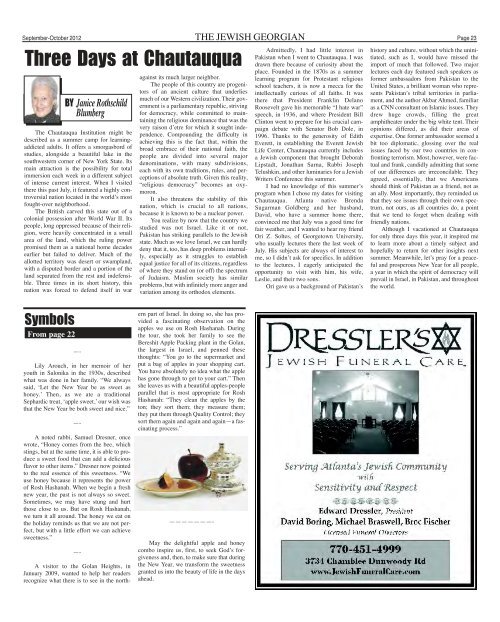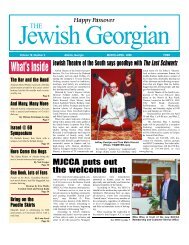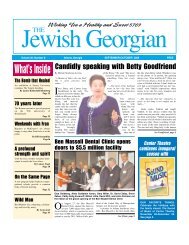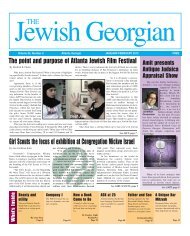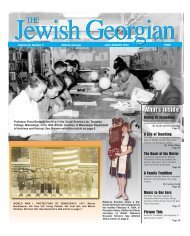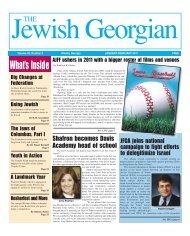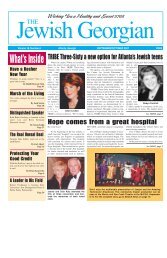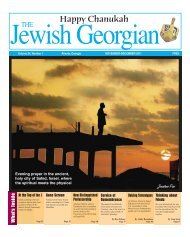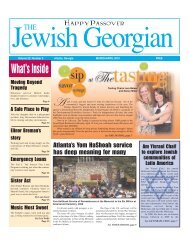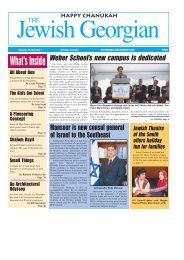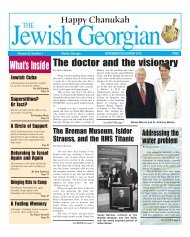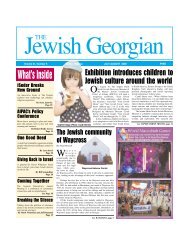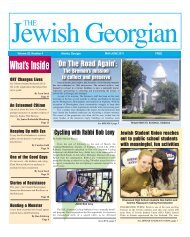mjcca news - The Jewish Georgian
mjcca news - The Jewish Georgian
mjcca news - The Jewish Georgian
Create successful ePaper yourself
Turn your PDF publications into a flip-book with our unique Google optimized e-Paper software.
September-October 2012 THE JEWISH GEORGIAN Page 23<br />
Three Days at Chautauqua<br />
<strong>The</strong> Chautauqua Institution might be<br />
described as a summer camp for learningaddicted<br />
adults. It offers a smorgasbord of<br />
studies, alongside a beautiful lake in the<br />
southwestern corner of New York State. Its<br />
main attraction is the possibility for total<br />
immersion each week in a different subject<br />
of intense current interest. When I visited<br />
there this past July, it featured a highly controversial<br />
nation located in the world’s most<br />
fought-over neighborhood.<br />
<strong>The</strong> British carved this state out of a<br />
colonial possession after World War II. Its<br />
people, long oppressed because of their religion,<br />
were heavily concentrated in a small<br />
area of the land, which the ruling power<br />
promised them as a national home decades<br />
earlier but failed to deliver. Much of the<br />
allotted territory was desert or swampland,<br />
with a disputed border and a portion of the<br />
land separated from the rest and indefensible.<br />
Three times in its short history, this<br />
nation was forced to defend itself in war<br />
Symbols<br />
From page 22<br />
BY Janice Rothschild<br />
Blumberg<br />
—-<br />
Lily Arouch, in her memoir of her<br />
youth in Salonika in the 1930s, described<br />
what was done in her family. “We always<br />
said, ‘Let the New Year be as sweet as<br />
honey.’ <strong>The</strong>n, as we ate a traditional<br />
Sephardic treat, ‘apple sweet,’ our wish was<br />
that the New Year be both sweet and nice.”<br />
—-<br />
A noted rabbi, Samuel Dresner, once<br />
wrote, “Honey comes from the bee, which<br />
stings, but at the same time, it is able to produce<br />
a sweet food that can add a delicious<br />
flavor to other items.” Dresner now pointed<br />
to the real essence of this sweetness. “We<br />
use honey because it represents the power<br />
of Rosh Hashanah. When we begin a fresh<br />
new year, the past is not always so sweet.<br />
Sometimes, we may have stung and hurt<br />
those close to us. But on Rosh Hashanah,<br />
we turn it all around. <strong>The</strong> honey we eat on<br />
the holiday reminds us that we are not perfect,<br />
but with a little effort we can achieve<br />
sweetness.”<br />
—-<br />
A visitor to the Golan Heights, in<br />
January 2009, wanted to help her readers<br />
recognize what there is to see in the north-<br />
against its much larger neighbor.<br />
<strong>The</strong> people of this country are progenitors<br />
of an ancient culture that underlies<br />
much of our Western civilization. <strong>The</strong>ir government<br />
is a parliamentary republic, striving<br />
for democracy, while committed to maintaining<br />
the religious dominance that was the<br />
very raison d’etre for which it sought independence.<br />
Compounding the difficulty in<br />
achieving this is the fact that, within the<br />
broad embrace of their national faith, the<br />
people are divided into several major<br />
denominations, with many subdivisions,<br />
each with its own traditions, rules, and perceptions<br />
of absolute truth. Given this reality,<br />
“religious democracy” becomes an oxymoron.<br />
It also threatens the stability of this<br />
nation, which is crucial to all nations,<br />
because it is known to be a nuclear power.<br />
You realize by now that the country we<br />
studied was not Israel. Like it or not,<br />
Pakistan has striking parallels to the <strong>Jewish</strong><br />
state. Much as we love Israel, we can hardly<br />
deny that it, too, has deep problems internally,<br />
especially as it struggles to establish<br />
equal justice for all of its citizens, regardless<br />
of where they stand on (or off) the spectrum<br />
of Judaism. Muslim society has similar<br />
problems, but with infinitely more anger and<br />
variation among its orthodox elements.<br />
ern part of Israel. In doing so, she has provided<br />
a fascinating observation on the<br />
apples we use on Rosh Hashanah. During<br />
the tour, she took her family to see the<br />
Bereshit Apple Packing plant in the Golan,<br />
the largest in Israel, and penned these<br />
thoughts: “You go to the supermarket and<br />
put a bag of apples in your shopping cart.<br />
You have absolutely no idea what the apple<br />
has gone through to get to your cart.” <strong>The</strong>n<br />
she leaves us with a beautiful apples-people<br />
parallel that is most appropriate for Rosh<br />
Hashanah: “<strong>The</strong>y clean the apples by the<br />
ton; they sort them; they measure them;<br />
they put them through Quality Control; they<br />
sort them again and again and again—a fascinating<br />
process.”<br />
———————-<br />
May the delightful apple and honey<br />
combo inspire us, first, to seek God’s forgiveness<br />
and, then, to make sure that during<br />
the New Year, we transform the sweetness<br />
granted us into the beauty of life in the days<br />
ahead.<br />
Admittedly, I had little interest in<br />
Pakistan when I went to Chautauqua. I was<br />
drawn there because of curiosity about the<br />
place. Founded in the 1870s as a summer<br />
learning program for Protestant religious<br />
school teachers, it is now a mecca for the<br />
intellectually curious of all faiths. It was<br />
there that President Franklin Delano<br />
Roosevelt gave his memorable “I hate war”<br />
speech, in 1936, and where President Bill<br />
Clinton went to prepare for his crucial campaign<br />
debate with Senator Bob Dole, in<br />
1996. Thanks to the generosity of Edith<br />
Everett, in establishing the Everett <strong>Jewish</strong><br />
Life Center, Chautauqua currently includes<br />
a <strong>Jewish</strong> component that brought Deborah<br />
Lipstadt, Jonathan Sarna, Rabbi Joseph<br />
Telushkin, and other luminaries for a <strong>Jewish</strong><br />
Writers Conference this summer.<br />
I had no knowledge of this summer’s<br />
program when I chose my dates for visiting<br />
Chautauqua. Atlanta native Brenda<br />
Sugarman Goldberg and her husband,<br />
David, who have a summer home there,<br />
convinced me that July was a good time for<br />
fair weather, and I wanted to hear my friend<br />
Ori Z. Soltes, of Georgetown University,<br />
who usually lectures there the last week of<br />
July. His subjects are always of interest to<br />
me, so I didn’t ask for specifics. In addition<br />
to the lectures, I eagerly anticipated the<br />
opportunity to visit with him, his wife,<br />
Leslie, and their two sons.<br />
Ori gave us a background of Pakistan’s<br />
history and culture, without which the uninitiated,<br />
such as I, would have missed the<br />
import of much that followed. Two major<br />
lectures each day featured such speakers as<br />
former ambassadors from Pakistan to the<br />
United States, a brilliant woman who represents<br />
Pakistan’s tribal territories in parliament,<br />
and the author Akbar Ahmed, familiar<br />
as a CNN consultant on Islamic issues. <strong>The</strong>y<br />
drew huge crowds, filling the great<br />
amphitheater under the big white tent. <strong>The</strong>ir<br />
opinions differed, as did their areas of<br />
expertise. One former ambassador seemed a<br />
bit too diplomatic, glossing over the real<br />
issues faced by our two countries in confronting<br />
terrorism. Most, however, were factual<br />
and frank, candidly admitting that some<br />
of our differences are irreconcilable. <strong>The</strong>y<br />
agreed, essentially, that we Americans<br />
should think of Pakistan as a friend, not as<br />
an ally. Most importantly, they reminded us<br />
that they see issues through their own spectrum,<br />
not ours, as all countries do, a point<br />
that we tend to forget when dealing with<br />
friendly nations.<br />
Although I vacationed at Chautauqua<br />
for only three days this year, it inspired me<br />
to learn more about a timely subject and<br />
hopefully to return for other insights next<br />
summer. Meanwhile, let’s pray for a peaceful<br />
and prosperous New Year for all people,<br />
a year in which the spirit of democracy will<br />
prevail in Israel, in Pakistan, and throughout<br />
the world.


